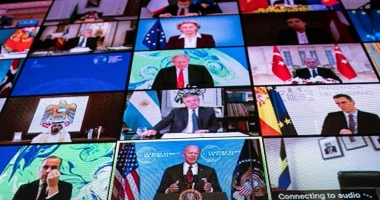Climate, Health and Equity Brief
Policy Action, Innovation, and Activism
December 20, 2019

|
Hot Topic: Progress. There’s no denying that the climate crisis is happening, and more news every week shows just how impactful it is. But as we head into 2020, we wanted to take a few moments to reflect on the progress that was made in 2019 and the stories that give us hope for the future.
Despite federal attempts to weaken protections and a stalemate on some of the biggest issues at COP25, new innovations have accelerated progress and laid the groundwork for major advances in the years to come. Governments across the country and around the world have passed policies to mitigate the impact of a changing climate. And dozens of major corporations have stepped up to show leadership and do their fair share.
Science has told us that negative health impacts of air pollution can be reversed and shed light on the best ways to leverage technology to reduce health impacts and increase equitable prosperity. And people around to world—led by the youngest among us—are organizing, speaking out and holding our leaders accountable. Climate change is the biggest planetary crisis we face, but these advances and move give us hope that real change is on the horizon. We look forward to continuing the fight with you all in 2020.
– Matt & Traci, GMMB
Programming note: The Brief will be on hiatus for the holidays, returning to your inbox on Friday, January 10. We wish you all a restful, reflective and joyful holiday break.
Innovation:
In late October, two MIT engineers detailed a process to absorb carbon dioxide from the air and released a paper highlighting potential for underground carbon capture or application in industrial systems. (Forbes)
Major automakers have embraced electrification this year, putting $225 billion towards the launching of new all-electric models and abandoning the production of traditional fossil fuel-reliant vehicles. (Quartz)
Heliogen, a clean energy startup backed by Bill Gates, discovered a breakthrough process in November which uses concentrated solar energy to power traditionally heavy carbon-emitting industrial procedures. (CNN)
Policy Changes
States across the U.S. have embraced clean energy legislation, with Colorado and New Jersey passing laws to shift electrical grids away from fossil fuels and Wisconsin passing an executive order to reach carbon-free electricity by 2050. (Grist, Utility Dive)
The U.K.’s Labour Party Shadow Chancellor proposed a new initiative that will remove companies from the London Stock Exchange if they fail to act on climate change. (Independent)
Italy will be the first country to mandate a class on climate change across all public schools next year, following an announcement from the government Education Ministry. (The Washington Post)
The European Parliament overwhelmingly passed a ban on single-use plastic items by 2021, echoing similar commitments and sustainability initiatives from a number of international companies this year. (Time, Reader’s Digest)
Health
A recent analysis found that reducing air pollution improves public health and reduces hospital visits in as little as two weeks. (Grist)
Deriving a majority of energy from solar and wind power could reduce the adverse health effects of electricity production by 80 percent, according to experts. (Phys.org)
Leaders of U.S. health care systems are combatting threats from the climate crisis by transitioning to carbon-neutral facilities and developing resiliency plans to respond to extreme weather events. (Harvard Business Review)
A Harvard study advised the best places to install renewable energy across the U.S. to maximize health and climate benefits. (SciTech Daily)
Research shows how reducing inequalities in the world’s poorest countries would improve mitigation of climate change, including ensuring access to adequate nutrition, sanitation, refrigeration, mobility, education, and basic health care. (The New York Times)
Corporate Action:
Businesses have made commitments to cut greenhouse gas pollution from global supply chains and are using their influence to push for policy action. (Forbes)
Major world banks in Europe and the U.S. have announced efforts to curb the effects of climate change, including ending the funding of oil and coal projects and pledges to donate to sustainable finance-related projects. (EcoWatch, CNBC)
Some fossil fuel companies invested in carbon removal and reduction initiatives this year, signaling efforts to embrace clean energy in the midst of an increasingly warming world. (The New York Times)
Hundreds of American companies actively supported the Global Climate Strike in September by donating commercial airtime to strikers and encouraging employee participation, among other things. (Fast Company)
Activism
Around 4 million people worldwide took part in September’s youth-organized Global Climate Strike, and youth activists continue to demand ambitious action at COP25. (Vox, EcoWatch)
Scientists and researchers have been on the front lines of climate activism this year, marching in global demonstrations and releasing a report declaring a climate emergency and providing six broad policy goals to address it. (The Los Angeles Times, The Washington Post)
Black church leaders in St. Louis are taking environmental justice action following their participation in the sixth annual Green the Church Summit, which aims to promote environmental justice and sustainability among black communities. (Religion & Politics)
As indigenous youth confronted the environmental devastation of their territories on platforms like the COP25 summit, indigenous leaders fought for the preservation of forests and natural resources, which have been depleted by profit-seeking companies and government officials. (Grist, Reuters)
Kicker:
In the giving spirit? Donating to these climate-focused charities and nonprofits is a gift that will keep on giving.
“The earth is a fine place and worth fighting for.” – Ernest Hemingway

)





